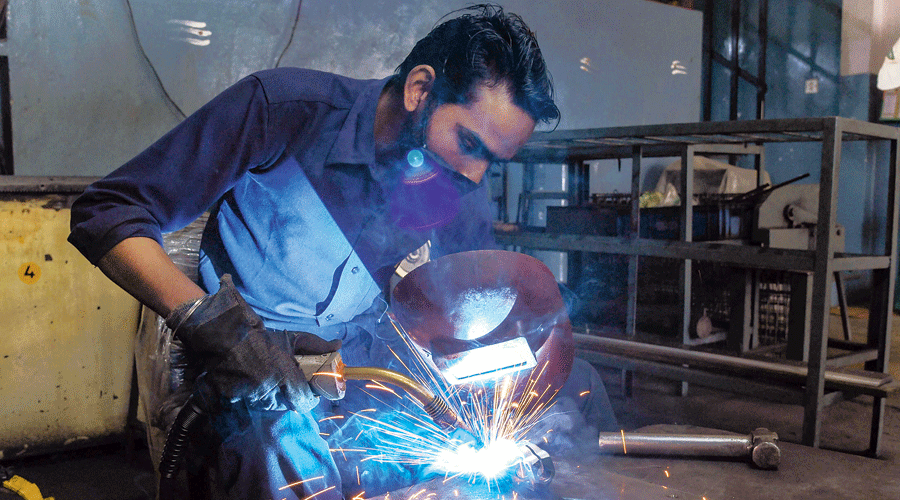When Bajirao Thengde voiced his fears about going to work after dozens of colleagues fell sick with coronavirus, his boss at a motorbike factory in Maharashtra said he should “learn to live with the virus”.
As India’s coronavirus cases exceeded one million last week, unions say similar spikes in infections in reopened factories are putting workers at risk.
It was only after several workers died and district authorities ordered a seven-day lockdown that Thengde’s plant finally closed on July 10, weeks after calls for it to shut when the first cases appeared.
“We were demanding that the factory be temporarily closed, but work carried on,” said Thengde, a union leader who has worked for more than 30 years for Bajaj Auto Ltd — India’s biggest motorbike exporter.
“The cases kept increasing despite us wearing masks, maintaining distance, using foot pedals to access water taps and eating lunch by ourselves. And then there were the deaths.”
Of the plant’s roughly 8,000 staff, 250 have tested positive for the virus, but with their pay dependent on showing up for shifts, Thengde said workers had little choice but to go to the factory.
Bajaj Auto could not be reached for comment,but managing director Rajiv Bajaj said in a recent TV interview that the “factory was the safest place to be”, saying employees were catching the virus in the community and bringing it to work.
Social distancing
India has issued health and safety guidelines for manufacturing facilities as part of a gradual exit from a weeks-long lockdown that has left millions jobless and short of food.
According to most estimates, the Indian economy will register a record contraction of over 4.5 per cent in the current fiscal year because of the pandemic.
Manufacturers are implementing measures such as temperature checks, mandatory wearing of masks, smaller shift groups and social distancing, industrial associations said.
State officials have also stepped up contact-tracing programmes around industrial hubs where cases have been reported.
“We are very concerned about workers falling ill,” said Pankaj Kumar, president of the Indian Industries Association, which represents small and medium-sized businesses.
Labour advocates, however, say the measures put in place do not go far enough, calling for more routine inspections, guaranteed living wages, as well as housing and transportation for workers during the pandemic.
“Workers are still not central to the unlocking of industries,” said Hemalata, who goes by one name and is the president of the Centre of Indian Trade Unions (Citu).
“While some industries may follow protocols, who will ensure that smaller and medium-sized factories have safety measures in place? What is the point of opening up if workers returning to work are falling ill?”
‘Cat and mouse game’
Sharanjit Singh was among tens of thousands of migrant workers who wanted to return home when India imposed its first lockdown in March to contain the pandemic.
Singh, who hails from Punjab, was talked out of walking home by his family and has since returned to his job at a reopened steel plant in Ballari in Karnataka.
“Then I heard of workers falling sick and was worried,” he told Thomson Reuters Foundation by phone.
“I really wanted to go back (home) then, but the company had not cleared my dues. I cannot leave without my final payment and now because of worker shortage, that is unlikely soon.”
More than 100 workers at the Jindal steel plant where Singh works have tested positive for coronavirus since June, with at least 10,000 quarantined after contact tracing, according to local media reports.
Frederick Castro, a spokesman for JSW Group, said prompt action had been taken to control the spread of infection among employees once their patient zero — a worker whose mother had tested positive — was identified.
“We’re taking care of every employee who is testing positive and have also extended outreach to the community,” he said.
But workers remain anxious as many states reimpose lockdown measures to stem the upswing in cases.
“I don’t want to fall sick,” Singh said, expressing a fear shared by many workers who are also desperate to start earning again.
“It’s like a cat and mouse game for workers,” said Gopinath Parakuni of charity Cividep, which campaigns on workers’ rights.
“Workers need the wages, but we have great concerns about what is happening on shop floors in factories. There is not much optimism that the industry will look at the workers well-being. They have not demonstrated that through the pandemic.”











